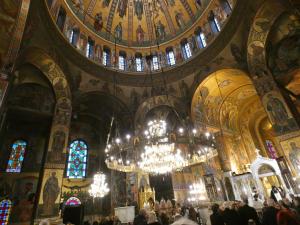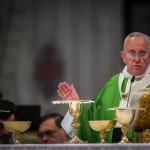
Jesus is the way. He directs and guides everyone, hoping to bring them together as one. Such unity will not, however, be one where everyone comes as they are, unreformed, so that their sins, their hate, their disdain for others remains; instead, he directs them to the path of love, to have them cast off the darkness found within so that they can embrace each other with pure love. Then, with that love, they can be truly united, and not just forced to be together, and through that unity, they will find themselves also drawn to and united to God, for God is love. Jesus, however, is the bridge; he is the one who connects us with God, who allows us to be connected with God, for Jesus is God-incarnate, the incarnate Logos through whom all things were made. “I am the door; if any one enters by me, he will be saved, and will go in and out and find pasture” (Jn. 10:9 RSV). He is the good shepherd. He goes out looking to bring back all those who have gone astray. “I am the good shepherd; I know my own and my own know me” (Jn. 10:14 RSV). Since everyone was created in and through the Logos, everyone is known by the good shepherd, and so the good shepherd is looking to bring everyone to unity with God.
When we are united together, we will find ourselves united in and with Jesus. We will truly understand what it means to say Jesus is the cornerstone or foundation for our unity. We will truly understand what it means to be the Body of Christ, for we are to be one with God, realizing that his humanity and ours is one and the same. For the Logos, the Son of God, assumed human nature, indeed, a created nature, so that he could be one with all creation. He opened himself up and made room for all creation in his personal life; that is, what he emptied from himself in order to assume human nature, indeed, a created nature, he handed over to creation so that all creation can then open themselves up to and receive it. In this way the incarnation works to bring the whole creation into the divine life, letting it become partakers of the divine nature. And so, as he is known by the Father, so we, in our unity with him, in and through all that we have received from him, we are known by the Father. We are known in the Logos or the Son, and so are known as children of God, not, of course, by nature but by grace.
To be sure, this would not be possible if there were no kind of relationship and connection between God and creation in the first place. Creation is not something entirely separate from God. That would be impossible, because God is omnipresent. Through God’s omnipresence, all things are within the presence of God, even as God is in all things. This means, all things already have their place in the kingdom of God. Ontologically, all that is, is that kingdom, for all things come to be and are sustained by the grace of God. What we are called to do is become more aware of this, to become conscious of our relationship with God. Then, we will allow our relationship with God to transform us, to make us greater, so we end up not having not only an objective relationship with God, but a subjective, that is personal, one as well.
And so, in our very creation, we find ourselves to be in God’s presence, though we certainly find our relationship with God, and so our embrace of that presence, differs from the way the persons of the Trinity are present with one another. We are created, contingent, bound (or limited) beings, meaning, we can only connect with God in a limited fashion, while the persons of the Trinity, being fully God, are without limits, and so are able to engage and penetrate each other perfectly and fully and without anything getting in the way of their unity. Thus, St. Gregory Palamas tells us, the persons of the Trinity are within each other, perfectly, absolutely, naturally, while God is within us, and we are within God, not in a natural fashion, but rather, in relation to God’s activity or energy:
God Himself is within Himself, since the three divine hypostases co-naturally and eternally cleave to one another and unconfusedly interpenetrate each other. Yet God is also in the universe and the universe is within God, the one sustaining, the other being sustained by Him. Thus all things participate in God’s sustaining energy, but not in His essence. Hence the theologians say that divine omnipresence also constitutes an energy of God.[1]
God is within us through God’s omnipresence, through God’s eternal activity. We experience the kingdom of God in accordance to the way we welcome that energy within us. God has made space for us, and welcomes us into that space; but for us to truly experience it in the way God wants us to, full of love and joy, we must make room for God and welcome God within our personal life.
Whenever we talk about God, or the kingdom of God, or the way we interact with God, all of it relates to the way we know and experience God through God’s divine activity (energy), that is, the way God interacts with us. What we understand of the divine nature, the way we describe it with all kinds of names which indicates various qualities which we attribute or predicate to it, are due to the way we apprehend God through that energy. We must not confuse what we know and speak of as being comprehensive of the divine nature in and of itself. Even the name of God, and all the qualities which we properly attribute to God, such as goodness, are really divine energies which we apprehend, energies which point to a greater, absolute truth which we cannot and will not comprehend:
The supra-essential, supra-existential nature that transcends the Godhead and goodness, in that it is more than God and more than goodness, and so on, can neither be described nor conceived nor in any way contemplated, since it transcends all things and is surpassingly unknowable, being established by uncircumscribed power beyond the supracelestial intelligences, and utterly ungraspable and ineffable for all. Neither in the present age nor in the age to come is there any name with which it can be named, nor can the soul form any concept of it or any word express it; and there can be no contact with or participation in it, whether sensible or noetic, nor any imagining it at all. [2]
What God is for God, that is, what God is for the persons of the Trinity, is beyond us and our comprehension. But yet, we have a way to engage God, so that, though God transcends us, God is also immanent with us and can be apprehended by us. That way is fully revealed to us in the incarnation of the Logos, for God the Word, God the Son, comes to us personally so that we can have a true, personal relationship with God. Through the incarnation, creation has been taken up and assumed by God. What God is to God, even if we do not know it, even if we cannot comprehend it, includes us; we are in and with the Logos, and so the interpenetration of the persons of the Trinity with each other include us. This is why we can and will have an experience with all the Trinitarian persons, and have a relationship with each of them. We will experience the love each person of the Trinity has for each other, as we will be joined in with that love by our connection with the Logos. Through that love, we will know the bliss, not only of created love, but of divine love. But, as we cannot and will not do so naturally, our experience will be one of pure grace; the more we apprehend it, the more we let it transform us, the more we will grow and become more like God, capable of experiencing more and more of the divine nature and grace for ourselves.
In our eternal life, we will find ourselves constantly growing in this manner, and so constantly experiencing more and more of God’s unbounded love. We will find ourselves on an eternal journey of love. We will constantly be amazed, because there will be infinitely more for us to experience, infinitely more for us to become aware of, and so infinitely more bliss for us to experience in and through our eternal relationship with God. But, we will also experience this, not just personally (or individually), cut off from everyone else, but communally. We will rejoice in the way each of us grows in grace and in love, the way each of us becomes more and more like God. We will experience in our unity with each other a reflection of the way the persons of the Trinity penetrate and receive each other. For the more we love, the more we will unite with each other and in and through that unity, we will find ourselves receiving even more love, more of God’s glory, in a way which we could and would not do if we existed in eternity as mere individuals This is because the glory of communal love is greater than the glory of individual love, as the teaching of the Trinity reveals to us.
[1] St. Gregory Palamas, “Topics of Natural and Theological Science and on the Moral and Ascetic Life: One Hundred and Fifty Texts,” in The Philokalia: Volume IV. Trans. and ed. G.E. H. Palmer, Philip Sherrard, Kallistos Ware, et. al. (London: Faber and Faber, 1995), 393 [104].
[2] St. Gregory Palamas, “Topics of Natural and Theological Science and on the Moral and Ascetic Life: One Hundred and Fifty Texts,” 393-4 [106].
Stay in touch! Like A Little Bit of Nothing on Facebook.
If you liked what you read, please consider sharing it with your friends and family!
N.B.: While I read comments to moderate them, I rarely respond to them. If I don’t respond to your comment directly, don’t assume I am unthankful for it. I appreciate it. But I want readers to feel free to ask questions, and hopefully, dialogue with each other. I have shared what I wanted to say, though some responses will get a brief reply by me, or, if I find it interesting and something I can engage fully, as the foundation for another post. I have had many posts inspired or improved upon thanks to my readers.













